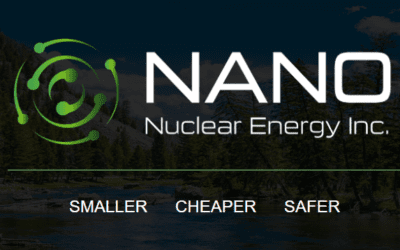NANO Nuclear Energy Inc. (NASDAQ: NNE) (“NANO Nuclear” or the “Company”), a leading advanced nuclear technology and energy company, today announced the launch of a major irradiation testing program in collaboration with the Massachusetts Institute of Technology (MIT) Department of Nuclear Science and Engineering. The two-year collaboration will investigate the thermal and radiolytic behavior of nitrate molten salts, commonly referred to as “solar salts”, to assess their viability in advanced nuclear energy systems for thermal energy storage and cooling applications.
Funded by NANO Nuclear through over $500,000 of research and development investment, the work will be conducted under the supervision of Prof. Koroush Shirvan, Principal Investigator and a leading expert in nuclear systems engineering. The research will focus on the of salt materials subjected to gamma irradiation using MIT’s Gammacell 220F Co-60 irradiator—ensuring a safe, precisely controlled, and highly instrumented test environment.
“We are proud to support this world-class irradiation study at MIT,” said Jay Yu, Founder and Chairman of NANO Nuclear. “Understanding how molten salts perform under radiation is essential to unlocking next-generation reactor designs, and this facility gives us the capabilities to do that without the use of any nuclear materials.”
While molten nitrate salts are widely used in solar thermal energy systems, the knowledge of these materials’ behavior under the ionizing radiation conditions representative of nuclear environments is relatively scarce. This collaboration aims to fill that critical knowledge gap by assessing both the chemical and thermophysical performance of the salts during and after irradiation.
Using a suite of cutting-edge diagnostics, including a magnetic sector residual gas analyzer (RGA), laser flash analysis, and post-irradiation spectroscopic techniques, MIT researchers will measure off-gassing behavior, thermal degradation, and long-term material stability. The results will inform system design for microreactors that utilize molten salts for heat transfer or energy storage, improving the accuracy and reliability of safety and performance models.
“This project offers an exciting opportunity to characterize molten nitrate salts in radiation environments with a level of precision not previously achieved,” said Dr. Koroush Shirvan, Principal Investigator at MIT. “We’re using real-time diagnostics, high-temperature test rigs, and modern analytical techniques to generate data that can have immediate impact on next-generation reactor development.”
The results of this study will feed directly into the engineering and design processes and could also prove useful for other clean energy applications, including industrial process heat and off-grid energy storage.
“We are thrilled to see this groundbreaking research move forward with MIT,” said Professor Ian Farnan, Lead of Nuclear Fuel Cycle, Radiation and Materials of NANO Nuclear. “The ability to assess salt performance in radiation fields without reliance on operating reactor gives us unprecedented flexibility and speed in advancing the development of our reactor systems.”
The project is expected to conclude in 2027, with quarterly updates and final data delivery coordinated between MIT and NANO Nuclear’s engineering teams. As NANO Nuclear continues to expand its operations, the Company remains committed to developing cutting-edge nuclear solutions that redefine the global energy landscape.
Related Articles
NANO Nuclear Files Six New Patent Applications Related to its Proprietary ZEUS™ Microreactor
NANO continues work to expand its intellectual property portfolio New York, N.Y., May 30, 2025 (GLOBE NEWSWIRE) -- NANO Nuclear Energy Inc. (NASDAQ: NNE) (“NANO Nuclear” or “the Company”), a leading advanced nuclear energy and technology company, today announced that...
NANO Nuclear Energy Closes $105 Million Common Stock Private Placement
NANO Nuclear’s cash position at over $210 Million, which will fuel the company’s continued innovations in the advanced nuclear energy sector Financing included primary participation from fundamental institutional investors, including a pre-eminent global investment...



